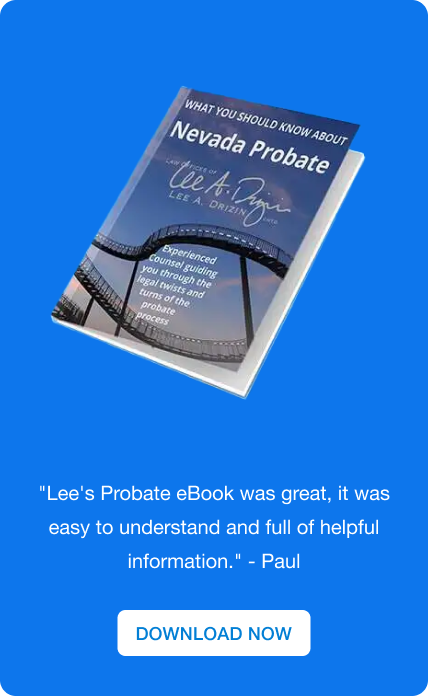Nevada Probate Process
If you find yourself in the unfortunate position of having to deal with the passing of a loved one, you may need to navigate probate in Nevada. This legal procedure can often appear daunting and filled with many complex details. Whether you’re handling probate for the first time or have encountered it before, understanding how to proceed is crucial.
In Nevada probate is a court-monitored process designed to ensure that the deceased’s wishes are honored while protecting the rights of heirs, creditors, and other interested parties. At Drizin Law, based in Las Vegas, we assist clients through this difficult period, helping them manage the responsibilities of settling an estate.
This introduction will lay the groundwork for what probate entails, why it’s necessary, and what initial steps need to be taken.
What is Probate?
Probate is a formal court process used to validate a deceased person’s will and distribute their assets. Probate ensures that the deceased’s debts are paid and that the remaining property is distributed according to their wishes or, if no will exists, according to Nevada probate law. In Nevada, probate is governed by a set of rules and statutes designed to handle the legal complexities involved in managing an estate.
The Nevada Probate Process: Step-by-Step Guide
Below, We’ll explore a step-by-step look into the Nevada probate process.
Initiate probate
Nevada probate begins when someone files a petition with the probate court. This petition is typically filed by a surviving spouse, a family member, or an interested party. The petition must be submitted to the district court in the county where the deceased resided. The Drizin Firm will front the filing fees for probate.
Once the petition is filed, the court will issue a Notice of Hearing. This notice must be sent to all heirs, beneficiaries, and creditors, ensuring they are aware of the probate proceedings. Notification is crucial, as it allows interested parties to contest the will or raise any objections.
Appointment of Executor or Administrator
After the initial hearing, the court will appoint an executor if there is a will or an administrator if there is no will. The executor or administrator is responsible for managing the estate throughout the probate process. Their duties include gathering all assets, settling debts, paying taxes, and distributing the remaining assets to the rightful heirs or beneficiaries.
An executor or administrator acts in a fiduciary capacity, meaning they must act in the best interest of the estate and its beneficiaries. They are responsible for making sure that all actions are legal and ethical, including the accurate accounting of all transactions.
Inventory and Appraisal of Assets
The next step involves making an inventory and appraising the estate’s assets. This includes identifying all property owned by the deceased, such as real estate, bank accounts, and personal items. The executor or administrator must compile a detailed list of these assets and their estimated value.
Valuing the assets may require professional appraisals, especially for real estate and valuable personal property. The Drizin firm can assist you with the selection of an agent, reviewing all sale documents and obtaining an order to facilitate the liquidation of assets with minimum stress.
Payment of Debts and Taxes
Before the assets can be distributed to the heirs or beneficiaries, the executor or administrator must settle any outstanding debts and tax obligations. This involves paying off creditors, settling final medical bills, and addressing any tax liabilities, including income and estate taxes.
If the estate does not have enough liquid assets to cover these obligations, the executor or administrator may need to sell some of the estate’s property. For example, a home may need to be sold to pay off debts. It is crucial to comply with Nevada law and obtain court approval for such sales. The Drizin Firm can also assist you in obtaining the necessary appraisals.
Distribution of Remaining assets
Once all debts and taxes are paid, the remaining assets can be distributed according to the will or, if no will exists, Nevada’s intestate succession laws. If the deceased person had a will, it would specify how the assets should be distributed. If there is no will, the assets will be distributed according to Nevada probate laws, which typically prioritize close family members.
Nevada has specific rules for distributing community property and separate property. Community property only goes to the surviving spouse. Separate property is divided.






















